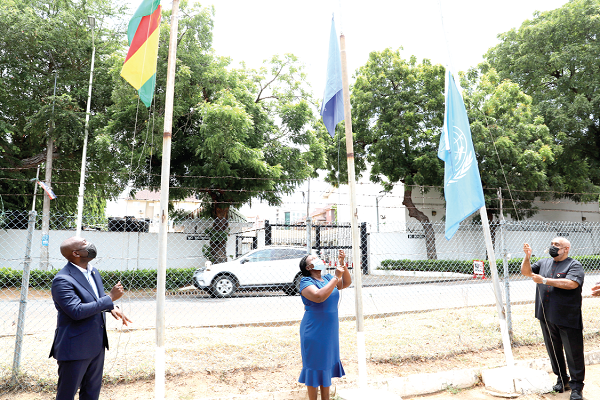
GJA commemorates Press Freedom Day
The Ghana Journalists Association (GJA) yesterday commemorated this year’s World Press Freedom Day at the Accra International Press Centre on the theme: "30 Years after the Windhoek Declaration: Information as a public good".
The event was attended by players in the media industry including members of the Ghana Independent Broadcasters Association (GIBA), the Ghana Journalists Association (GJA), the Editors Forum-Ghana, the Institute of Public Relations (IPR) and some retired journalists.
Also present were the Chairman of the National Media Commission (NMC), Mr Yaw Boadu-Ayeboafoh, the Country Director of the United Nations Educational, Scientific and Cultural Organisation (UNESCO), Mr Diallo Abdourahamane, and the U.S. Ambassador to Ghana, Ms Stephanie S. Sullivan.
COVID-19 impact
The Minister of Information, Mr Kojo Oppong Nkrumah, alleged that some "paymasters" were taking advantage of the negative impact of COVID-19 on the finances of media establishment to unduly influence practitioners.
According to him, the pandemic has had an impact on media practice due to the inability of media owners to adequately resource journalists and protect them from vulnerabilities.
Advertisement
"The first risk impact of the pandemic is paymasters with ill motives from various quarters capitalising on this challenge and seeking to call the tune as pipers for public interest media to follow," he further claimed.
Mr Oppong Nkrumah also entreated media owners not to lay off workers or reduce salaries due to the hardships brought upon their finances by the pandemic.
His outfit, he said, had informed the Finance Ministry of the need to consider tax exemptions for media houses under the COVID-19 relief scheme to help reduce the impact on their finances.
The minister added that it was the responsibility of the media to ensure that information that was served to the public was in the national interest.
"We must value information; information not laced with various interests, information not laced with snippets of disinformation, but information that is pure and sacrosanct to the democratic exercise and the development of our county," he said.
Significance
Mr Abdourahamane said the event was timely as there were ongoing conversations in the media landscape in the country about press freedom, safety of journalists, access to information, Right to Information (RTI) Broadcasting Bill and how to curb disinformation and hate speech.
"It all began at a UNESCO seminar in Windhoek in 1991 where a group of African journalists and media professionals acted as a catalyst to encourage press freedom, independence and pluralism in Africa and in other parts of the world," he explained.
The Country Director acknowledged the significant role played by pioneers such as Ms Ajoa Yeboah Afari, a former President of the GJA in media practice in the country.
"We owe them this major contribution which is the Windhoek Declaration, which is considered a benchmark for ensuring press freedom around the world," he added.
Mr Abdourahamane also said the theme for the celebration recognised the changing communications system that was impacting on health, human rights, democracies and sustainable development in the world.
He, however, said the murder of a journalist, Mr Ahmed Suale, whose assailants were still on the loose more than two years after his death had resulted in the country’s position on the World Press Freedom Index compiled by Reporters without Borders.
Ghana is currently ranked 30 among 180 countries globally, an assessment based on the level of freedom available to journalists, including insecurity and continuous threat on lives of media practitioners in the line of duty.
The United Nations Resident Coordinator, Mr Charles Abani, urged the public to renew effort at protecting media freedom for public good.
"Free and independent journalism is our greatest ally in combating misinformation and disinformation and an important contribution to a thriving democracy," he said.
Self-discipline
For his part, Mr Boadu-Ayeboafoh, also called on media practitioners to be self-disciplined and responsible in their activities to help preserve the integrity of the press.
"We must ensure that we are very balanced and professional in our reportage and also assure that whatever we are putting out is in the public interest and that we are giving out information as public servants," he added.
He also called on the public to be tolerant and accommodate varied opinions that may be expressed by journalists and refrain from attacking them.
